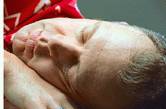Resolve to Get Enough Zzzzs This Year
Experts offer tips on spotting problems and achieving better, longer sleep.
|
E-mail this article
Subscribe to news
Printer friendly version
|

(SOURCE: American Academy of Sleep Medicine, news release, December 2007)
TUESDAY, Jan. 1 (HealthDay News) -- Making and keeping a New Year's resolution to sleep better could help you achieve other health goals, experts at the American Academy of Sleep Medicine say.
"There is growing medical literature showing that many of us in today's 24/7 society are not getting the basic sleep we need every day," Dr. Ron Kramer, a physician at the Colorado Neurology Institute's Sleep Disorders Center in Englewood, Colo., said in a prepared statement.
"At the same time, there is increasing evidence from human sleep researchers that chronic lack of even a few hours of sleep a night can result in significant health consequences," he said. "These consequences include an increased risk of accidents; fatigue that makes you prone to depressive symptoms or not enough energy to exercise; and even chemical changes that stimulate your brain to eat more and to eat more salty and sugary food."
"Resolve to sleep well this year, and you may find that the energy to exercise and the self-control for healthy eating may then more easily follow," said Kramer.
Adults need seven to eight hours of sleep each night, while teens should sleep about nine hours per night. School-aged children require between 10 to 11 hours a night, and children in preschool need between 11 and 13 hours a night, according to the AASM.
Wondering if you're getting the shuteye you need? The society offers seven key signs that you need more sleep:
- Depending on an alarm clock -- and repeatedly smacking the snooze button -- to wake up in the morning.
- Driving drowsy or falling asleep at the wheel.
- Drinking more than one cup of coffee a day to stay alert.
- Making mistakes that could be avoided with better concentration.
- Forgetting things more easily.
- Feeling blue, anxious or frustrated.
- Becoming sick more frequently. Sleep is necessary for a strong immune system.
These problems can be resolved with more and better sleep, according to the AASM, which offers these tips on getting a good night's sleep:
- Follow a consistent bedtime routine.
- Establish a relaxing setting at bedtime.
- Get a full night's sleep every night.
- Do not go to bed hungry, but don't eat a big meal before bedtime either.
- Avoid alcohol, foods or drinks that contain caffeine, and any medicine that has a stimulant, prior to bedtime.
- Avoid any rigorous exercise within six hours of your bedtime.
- Make your bedroom quiet, dark and a little bit cool.
- Get up at the same time every morning.
More information
To learn more about how to improve your sleep habits, visit the American Academy of Family Physicians. 
Copyright © 2008 ScoutNews, LLC. All rights reserved. 
HealthDayNews articles are derived from various sources and do not reflect federal policy. healthfinder.gov does not endorse opinions, products, or services that may appear in news stories. For more information on health topics in the news, visit the healthfinder.gov health library.